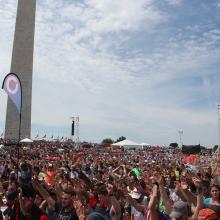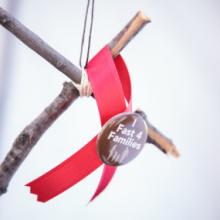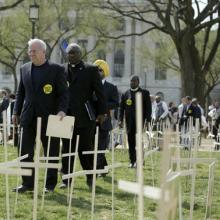national mall
Ashon T. Crawley, author, artist, and professor of religious studies and African American and African studies at the University of Virginia, constructed a memorial for Black church choir directors who died during the U.S. HIV/AIDS crisis. The exhibit, “HOMEGOING,” told the story of the musicians who, as he puts it, “died within a kind of epistemological moment,” where to be a musician in the Black church was to be understood as gay, to be gay was to be understood as HIV-positive, and vice versa.
Last year, Suzanne Brennan Firstenberg, a social practice artist, created In America: Remember — a vast field of flags on the national mall, one for each American who died from COVID-19. Visitors, both in-person and digitally, had the opportunity to dedicate a flag by writing a message on the while poly film. When the installation began in mid-September of 2021, there were 666,624 deaths. When the installation closed in early October, there were 701,133 deaths. As of this week, nearly 1 million people have died of COVID-19 in the United States, 6 million globally. As we try to grapple with the weight of these fatalities, we’re revisiting an interview from late October 2021 between Firstenberg and Sojourners associate culture editor Jenna Barnett, in which they discuss what it looks like to honor grief and memorialize an ongoing pandemic.
The exhibit is not intended as commentary on today’s politics, its organizers said. Work started on the project six years ago, before sharp rises in Islamophobic rhetoric and violence in the U.S. and Europe, and before Muslim immigration and culture became a flashpoint in American and European politics.
But the Smithsonian is not sorry for the timing, and hopes the exhibit can help quell fears of Islam and its followers.

Image via Adelle M. Banks / RNS
Evangelical Christians converged on the nation’s capital for a prayer rally on one of the hottest days of the summer.
With the nation reeling from recent shootings and shocked by news of a terrorist attack in France and an attempted coup in Turkey, speakers at “Together 2016” cited the global events from the stage and spoke of the challenges facing Americans.

Image via James Lawler Duggan / REUTERS / RNS
Facing throngs of people on the National Mall, Nation of Islam Minister Louis Farrakhan called for justice Oct. 10 as he rallied African-Americans, Latinos, and others during an anniversary protest at the U.S. Capitol.
In a speech that lasted more than two hours, Farrakhan said the United States was hypocritical for insisting other nations were violating human rights, all the while describing its own misconduct as something that causes Americans “dissatisfaction.”
His “Justice or Else!” event came 20 years after hundreds of thousands of black men came to the same stretch of lawn between the Capitol and the Washington Monument to rededicate themselves to being better fathers, sons, and citizens.
IT WAS LIKE the end of the movie Lincoln. In an instant, one whole side of the House of Representatives turned, looked up at the five core fasters from the Fast for Families and erupted in overwhelmingly spirited applause. The applause reverberated throughout the chamber for what seemed like an eternity, though it was really only minutes. Ah, but what grand minutes. I wept. My body, standing there in the gallery, could not contain it.
The Fast for Families: A Call for Immigration Reform and Citizenship was launched on Nov. 12 with core fasters abstaining from all food and drinking only water. Based in a tent on the National Mall, only a few hundred yards from the Capitol building, the fast was sponsored by nearly 40 church and labor organizations and garnered support from more than 4,000 solidarity fasters across the U.S. and around the world. Our goal: To move the hearts and compassion of members of Congress to pass immigration reform with a path to citizenship.
In the Capitol building on Dec. 2, during the hour before the startling ovation, Eliseo Medina (the leader of the fast, which had reached the end of its 21st day on that Monday evening), D.J. Yoon (executive director of NAKASEC, a Korean-American advocacy agency), Cristian Avila (from Mi Familia Vota), and I received House member after member who’d come to visit us in the gallery to say “thank you for your sacrifice.” All the faces and names you usually see flashed across the screen commenting on the events of the day on cable television shows—they came to us, standing in the flesh, shaking our hands, grateful and concerned for our health.
To join Jim Wallis in prayer and fasting, click here.
I was grateful to be at the beginning of the Fast for Families on November 12. Courageous leaders from many communities were making an incredible sacrifice to remind our leaders what is really at stake in the fight for immigration reform. It was an honor to commission the core fasters, such as my Sojourners’ colleague Lisa Sharon Harper and Eliseo Medina, a veteran organizer and a disciple of Cesar Chavez, by placing crosses around their necks as they began abstaining from food.
After 22 days, the core fasters had grown weak, nearing the point of medical danger. When they decided to pass the fast to a new group, I was humbled to join the effort this way. On Tuesday, in the shadow of the U.S. Capitol, I received the cross from Eliseo that I had given to him three weeks before.
At Tuesday’s ceremony, each of us shared why we were committing to this discipline and willing to subsist only on water for various lengths of time.
Thousands of people flooded the National Mall on Wednesday to call on Congress for commonsense immigration reform that includes a roadmap to earned citizenship for the estimated 11 million undocumented immigrants living in the United States.
Coupled with a day of lobbying on Capitol Hill and sibling rallies across the country, Wednesday’s was one of the biggest immigration rallies to date. Sponsored by the Service Employee International Union, Casa de Maryland, the NAACP, and more, the rally began with an interfaith prayer service and featured the voices of faith leaders, including UMC Bishop of Los Angeles Minerva Carcaño, Director of Religious Action Center for Reform Judaism Rabbi David Saperstein, Director Hispanic Diocese of Arlington Padre Jose Eugenio Hoyos, and Islamic Center of Maryland Imam Jamil Dasti.
Clergy from California to Connecticut created a makeshift graveyard symbolizing victims of gun violence on the National Mall on Thursday as they exhorted Congress to pass legislation to limit access to firearms.
Standing in front of 3,300 grave markers — representing the number of people who have died in gun violence since December’s massacre in Newtown, Conn. — more than 25 ministers, rabbis and other religious leaders decried as “idolatrous” a society that values guns more than human life.
“We don’t have a Second Amendment issue,” said the Rev. Matt Crebbin of Newtown Congregational Church. “We have a Second Commandment crisis.





